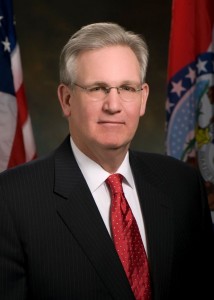
By Eli Yokley
JEFFERSON CITY, Mo. — After months of campaigning across the state for his plan to expand Medicaid to some 300,000 Missourians, Gov. Jay Nixon spent time over the past week campaigning for the hearts and minds of GOP lawmakers.
On Tuesday, Nixon met with the Senate Republican Conference to tout his proposal, as well as field some two-dozen questions from curious lawmakers.
“Today was an opportunity to discuss ways to go forward,” he told reporters after wrapping up his meeting.
Nixon said it was his belief that debate over expansion has “fundamentally shifted,” as he and expansion’s supporters have ran an “educational” campaign — not only for the public, but also for the lawmakers. He pointed to several areas where he believes he can find common ground with skeptical Republicans, including building triggers and sunsets in to the plan, stressing “personal responsibility,” finding a “market-based” approach, and “rewarding work.”
Nixon’s original plan, presented to lawmakers during his state of the state address in January, called for expansion to Missourians living at or below 138 percent of the federal poverty level. Currently, legislative vehicles pushed by Republicans cap out at 100 percent of the federal poverty level.
Nixon said he would be willing to seek a waiver, but wants lawmakers to act in some fashion to get the federal dollars, first, while the federal government would pay 100 percent of more than $5.6 billion in costs.
“You’ve got to get to 138 percent in some fashion,” Nixon said.
Under the federal law, the federal government would pay 100 percent of the cost of expansion for the first three years, before slowly pulling back to 90 percent by 2020. Republicans have expressed their concern that after all the states are accepting funds at various cost-share levels, the federal government will make moves to equalize their share, potentially cutting Missouri’s funds.
Senate Pro Tem Tom Dempsey told reporters he thought the governor had a thoughtful discussion with his caucus and was appreciative of the gesture. Last week, Nixon held a similar discussion with the House Republican Caucus, both the first moves of their kind for Nixon, who often avoids getting overly involved in the on-the-ground legislative process.
Nixon said he would only be willing to call a special session of the General Assembly on the issue if they were “really close” to an agreement, but added: “We still have the time with six more weeks to go.”
On Tuesday, also met with the Senate Democratic Caucus later in the afternoon, before speaking by phone with U.S. Health and Human Services Secretary Kathleen Sebelius about his discussion with Republicans and other ways to move forward with expansion.
After speaking with reporters, Nixon took an elevator down to the first floor of the capitol, where he was greeted by thunderous applause from a few hundred disability rights advocates gathered for their day at the Capitol. After touting work his work disability rights issues, Nixon pivoted to the issue of Medicaid.






